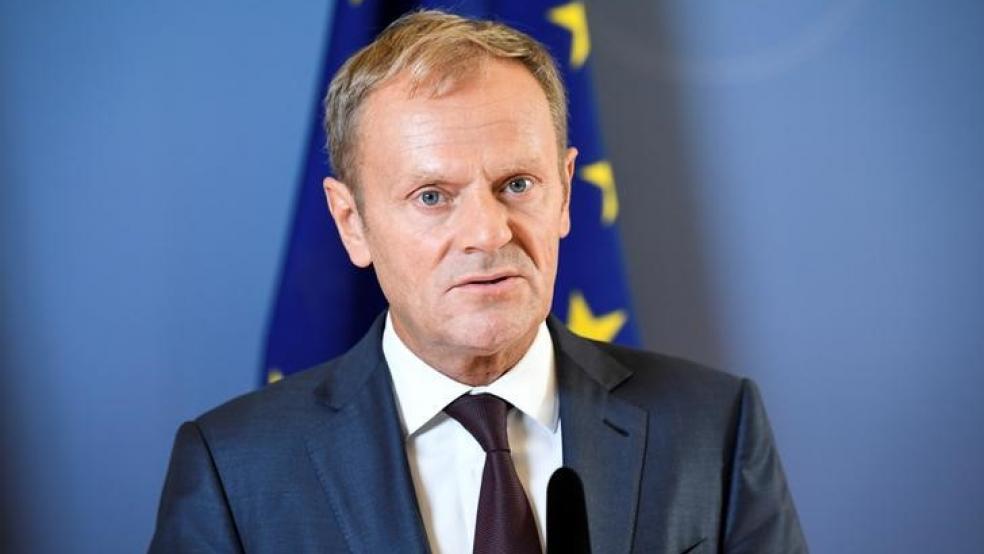May, attending her first EU summit since becoming prime minister in July, has so far given only glimpses of her vision for Britain's future relationship with the EU.
Below is a summary of the most important issues in the negotiations which are due to start by March next year.SINGLE MARKET ACCESSBritish firms are likely to face barriers to the EU's single, tariff-free market of 500 million consumers because May has said she will heed the call from many voters for more controls over migration. Such controls would breach the EU's core principle of freedom of movement for workers in the bloc.Supporters of a "hard" Brexit say Germany and other EU nations are bluffing about putting tariffs on British goods and services because their own exporters have too much to lose.But employers are worried, especially in sectors which would could face the highest tariffs if there is no deal between London and Brussels. The EU's external tariffs on cars stands at 10 percent and Nissan - which exports to the bloc thousands of the vehicles it builds at Britain's biggest car plant - has demanded a guarantee of compensation for costs related to Brexit.MIGRATION About half the immigrants coming to Britain are from the EU. May wants to cut total net migration to below 100,000 a year from more than 300,000 now, something that would require tough controls.Most economists say migration has helped Britain's economy although wages for lower-paid workers have taken a small hit.May has ruled out the introduction of a points-based system modeled on the one used by Australia to select migrants, preferring a system that allows in the workers most needed by British employers. Since then, government ministers have said they want to ensure highly skilled workers can continue to move to Britain.But EU leaders are unlikely to turn a blind eye to any restrictions on free movement of workers from the bloc. They fear that any concession to Britain would lead other states to demand similar deals, ultimately unraveling the Union. FINANCIAL SERVICESBritain's financial services industry fears it could be one of the big losers from Brexit. Banks could lose their ability to offer services across the bloc from London, a system known as passporting. If they shift some of their operations to other EU states, it could hurt British tax revenues at a time when the country's public finances are still likely to be in the red.One battle could be over the ability of London to continue serving as the main center for the clearing of derivatives denominated in euros, something it has fought in the EU courts to protect but may be unable to defend once outside the bloc.BUDGET The pro-Brexit campaign before June's referendum argued that once outside the EU, Britain would no longer have to make contributions to the bloc's budget, which the UK Statistics Authority estimated at about 7 billion pounds a year.But Britain might still have to pay into the EU budget in order to maintain access for its financial services industry or other key sectors. Norway and Switzerland both pay into the EU budget to have preferential access to the EU market.CUSTOMS UNION VS TRADE DEALSBritain could seek to remain part of the EU's customs union once it is no longer a formal member of the bloc. The customs union includes non-EU Turkey, Andorra and San Marino who trade freely with the bloc and share its common external tariffs. But if Britain opted to stay in the customs union, it could complicate attempts to strike free trade deals with other countries around the world, a central argument of the Brexit campaign.British finance minister Philip Hammond said on Wednesday he was sensitive to the potential problems for British exporters, especially those involved in cross-border supply chains, should the country end up outside the customs union.MECHANICS OF NEGOTIATIONMay has said she will launch the formal, two-year process of negotiating Britain's exit from the EU before the end of March 2017 and London wants to use the interim period to sound out European counterparts and decide its priorities for the talks. So far, EU leaders have rebuffed attempts by Britain to talk informally about the outlines of a final deal, something that would help London settle on its Brexit strategy.After May triggers the exit process, the other 27 EU leaders will meet within a month or two to draft instructions for the European Commission for the negotiations. Those talks will be led on the EU side by Michel Barnier of France, who had tense relationship with London when he was the Commission's financial regulation chief from 2010 to 2014. Diplomats in Brussels say two years will probably be enough to deal with the basic divorce, including dividing up the EU budget, EU assets and tricky stuff like the substantial future liabilities for paying the pensions of British EU staff. But a new relationship, including trade ties, will probably take many more years, requiring some kind of transition agreement so that Britain is not left in limbo. Britain has an incentive to wrap up the deal within the two-year time-frame to appease voters and influential Euroskeptic lawmakers before a national election due in May 2020. The EU has a strong incentive to wrap up the final exit before the next European Parliament elections in 2019, normally in May. (Writing by William Schomberg; additional reporting by Alastair MacDonald in Brussels; Editing by Toby Chopra)Factbox: UK heads for Brexit showdown with EU - what's at stake

© TT News Agency / Reuters



